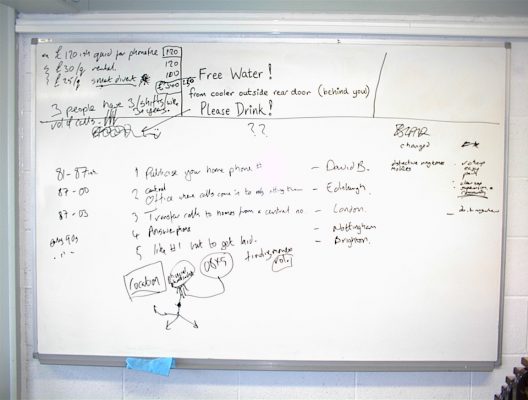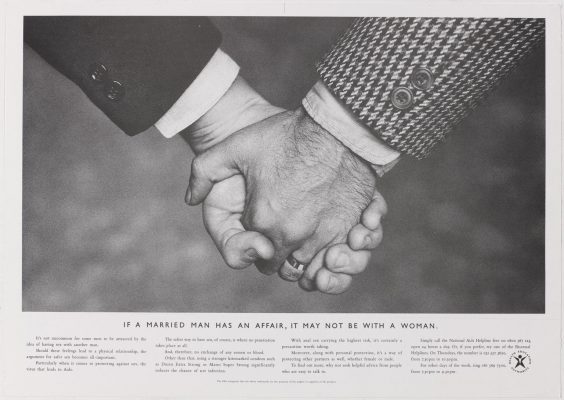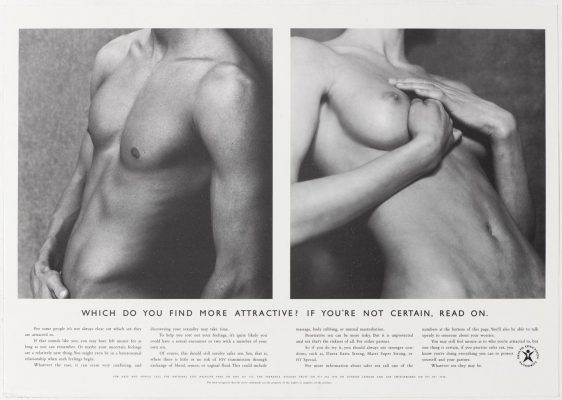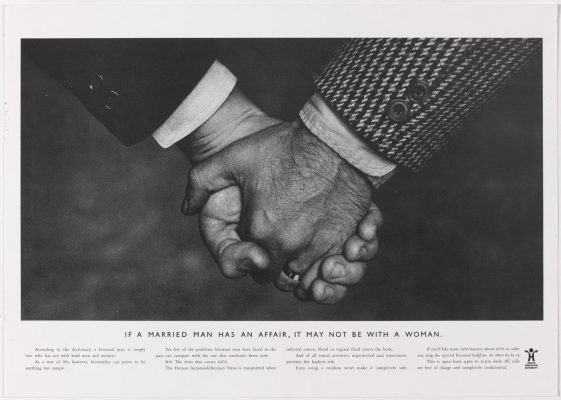One of the sessions at BiCon 2003 was "Number unobtainable – what next for bisexual phonelines?"
This is an expanded version of that session, now with added bisexual phoneline.. that I forgot about until after first publishing it, ahem.
At that point, there had been five six 'bisexual phonelines' in the UK and none of them were operating any more.
All phonelines have some factors in common. Some callers have had the number for years before deciding to actually call it; others have only just noticed it. The caller choses when to call, can hang-up at any time, and may never call again.
You will wish that some people who do call again wouldn't – learning to spot a repeat caller you can do nothing to help and is blocking the line for other people is a very useful skill.
Compared to many other LGBT phonelines, the bisexual phonelines got far fewer abusive calls – possibly because they were never so widely publicised. We also had fewer silent calls, where the caller would say nothing before eventually hanging up (after a minute or two, the person answering the call usually says a little spiel about it being ok not to say anything and to call back at another time – unlike some, the London phoneline didn't have a policy of never hanging up on silent callers, but would do so after giving a gentle warning), and 'wank calls', where the caller is more or less obviously masturbating while on the line.
So what were the six?
1. Do it from home
As part of organising the first meeting of the London Bisexual Group back in September 1981, David Burkle put his home phone number as a contact. Although the group itself soon started renting a mail forwarding address ('BM Bi' at British Monomarks), the phone number stayed fairly widely publicised..
.. and around twenty people a week rang it. Some were straight information calls ("What's happening at the LBG this week?") but most were counselling calls from people who wanted personal assistance. David wrote about the experience in an article in the Bi-Monthly magazine that was reprinted in Bisexual Lives and, as he says, "there are several disadvantages in operating a telephone counselling service from home".
By 1987, he'd had enough of doing it this way. Because of how phonelines work – see above – he doubtless continued to get calls, but callers could be 'signposted' to another bisexual phoneline…
2. Do it from an office
In January 1987, the Edinburgh Bisexual Group was meeting at the (then) Lesbian & Gay Centre in Broughton Street on Thursday evenings. The basement room they used had a side room, and once a couple of phones were installed, this became the home for the Edinburgh Bisexual Phoneline.
The advertised hours, two hours on a Thursday evening, were the same as the EBG's. If a call came in, one of the two people 'on duty' would leave the meeting and answer the phone. They planned to have a man and a woman available each Thursday.
Having an office is the classic way for groups with resources to have a phoneline: it's how London's Gay / Lesbian & Gay Switchboard – now just 'Switchboard' – has operated since starting in 1974, for example. They used a room above Housemans, the alternative bookshop in London's Kings Cross area, before moving up the road a bit to their own offices.
Similarly London Friend, venue for the London Bisexual Group from the late 80s until it ceased meeting, runs their phoneline from their basement.
The disadvantages include that you need somewhere, and that usually costs money, sometimes lots of it.
If you're doing this somewhere like London, you can often have people spending an hour travelling to the 'office', doing a shift of two or three hours, then spending an hour going home afterwards.
The advantages include that there's a clear separation between 'phoneline' and 'normal life'. If you have a secure office, you can keep resources and records there. It is also easier to have more than one phone line for your phoneline if you have a single location.
There's a 1997 Bi Community News article from two people then helping organise the Edinburgh phoneline. (The 'Friday' in the last paragraph is almost certainly a typo!)
It stopped operating in early 2000, when the Edinburgh group closed. The Centre had been the Lesbian, Gay and Bisexual Centre since BiCon 1994.
3. Do it from home.. via a central number
David organised the London Bisexual Helpline which opened later in 1987 for many years. It had a new number that could be redirected to people's homes. At the start, this was done by an expensive[1]It cost several hundred 1980s pounds, so say a thousand pounds in 2020's money. An anonymous donor covered the cost. Update: Having found a fax about some problems with it, I am reminded that it was … Continue reading box – bought from a telecoms shop that was right by Housemans[2]'CallSaver' – possibly related to a later shop of the same name, now also gone, which was across the road. – which was located in someone's flat and could do what was then almost magical…
Callers to the published number got a message that said something like 'Please wait.. connecting..' while it dialled out on a second phone line to one of ten or so numbers that had been programmed into it. When that number answered, the two lines would be effectively connected together.
From the person on duty's perspective, you dialled the box at the start of your shift and then, as it answered, dialled a series of code numbers that said 'Hello, I'm someone who really has the right to do this, and[3]Update: having found the instruction sheet, there wasn't a PIN and the only protections against random people doing this were a) not publishing the box's private number and b) a forty second wait … Continue reading I'd like you to redirect incoming calls to the nth phone number in your list until told otherwise'. That list was presumably set up by another set of codes that I was never given.
At the end of the shift, you dialled the box again, and gave it the codes for 'stop redirecting calls'. Callers would then get a message from an answerphone that was plugged into the phone line and/or the box.
From the phoneline's perspective, it meant paying for two phone lines (the published number and the number that dialled out), and the occasional repair to the box when it stopped working, but the saving in travel costs – time and money – meant it was worth it.
Training was done by having the new person visit an existing person's home, listening to them dealing with calls for a couple of evenings, then taking calls with them listening. After a few shifts like that, they would almost always be added to the rota.
Every two or so months, usually on a Sunday, everyone working on the phoneline would get together somewhere – the main place I remember was the London Lighthouse (an Aids hospice in Kensington) which had a nice cafe and very comfy chairs and beanbags in its meeting rooms – to discuss calls, the shift rota, and have some continuing training and support. It was an opportunity to spot repeat callers and talk about policies like the 'non-directional' approach the phoneline took: callers wouldn't be told what to do, but we'd explore options with them and leave the final decision about whether to come out or visit a bi group or.. up to them.
Initially operating on Tuesday and Wednesday evenings, at some point in the early 90s, Saturday lunchtime was also added for a total of six hours a week.
With the exception of the initial donation, all this was largely unfunded work as usually understood. There were 'bucket rattle' collections at events like BiCon, and the London Bisexual Group did the odd fundraiser too. A trio of anonymous donations around the 9th National Bisexual Conference in 1991 raised an impressive £1,600 which would have been enough to keep the London one going for about four years.
The main exception followed the second (and final?) run of the Health Education Authority's 'hands' ad, the only bit of "bisexual" advertising they ever did. That one included the two bisexual phonelines' numbers and they were willing to fund the London one to extend its service to six days a week for a couple of months.
A combination of their refusal to fund existing work and – I think – the way that the money was officially for England & Wales only meant they wouldn't let the Edinburgh group have any of it, annoyingly. There was enough money for the London line to recruit some additional people, do some additional training, and pay people a few quid per shift during those months.
When the HEA ran their 'torsos' ad (a male and a female torso, both topless, with a strapline of 'Which do you find more attractive? If you're not certain, read on.') they absolutely refused to mention the bisexual phonelines. This was for "undecided" people, not bisexuals! They did provide the number of the (then distinctly biphobic) London Lesbian & Gay Switchboard though…
In 1996, the box either needed an expensive repair or the services available from BT improved to the point that we no longer needed it[4]Sadly, I think the original box was junked when the new system was introduced, because it would have been fascinating to open it up and see how it worked. There must have been an 8-bit CPU in there … Continue reading or both.
When I investigated, it turned out that for around the cost of the second phone line, we could use BT's then brand new 'Smart Divert' service which did what the box did, including charging us for the call 'from' the published number to the actual destination, except instantly and without needing a second phone line, all for a "quarterly fee for the privilege of letting BT charge twice for one call".
It meant that, for example, people could do shifts even if they weren't at home. We could have even, if we'd been prepared to pay the international call fees, redirect calls to almost anywhere in the world.[5]There were a couple of countries excluded, probably due to fraud. The phoneline was one of the first BT customers to use it[6]I can't remember where I heard about it – probably the online conferencing service cix where someone working at BT may have mentioned it: "In its heyday, CIX was one of the UK's premier online … Continue reading and I had to explain to some BT sales person exactly what to do to find it in the company's extremely long price list.
Overall, the new system was a noticeable improvement and it all went fine, until the point where the person whose flat the phoneline's number went to moved home.
What the article doesn't say is that, in common with most of the helplines I talked to, we were already noticing a significant drop in the number of calls because of the increasing popularity of 'the internet', i.e. the web. Instead of getting a handful of calls per shift – the number depending on how long they were more than anything else – it was getting increasingly common to have no calls at all.
Obviously, that made doing shifts somewhat frustrating and made training new people in the way that had worked for over a decade almost impossible.
At some point early in 2003, there was a problem with the 0845 number or the BT line that it redirected to, very probably the latter. I can't remember exactly what it was – BT deciding to charge more for something and not telling us, I think.
In any event, it would have cost us more to have the phoneline continue and, asking around, given the call volume we were getting, the people left doing it decided to close the line. An annual financial cost of around £340 for phone line, smart divert and calls, plus £120 for the 0845 number is one thing when you're getting up to a thousand calls a year; when you're getting closer to fifty, it's another.
I still think it was the right decision, but before the line at my flat was cut off, one young woman left a message on the answerphone there that expressed the reason that it existed. I hope she was able to find help elsewhere.
4. 'We'll do it for you'
.. or, the one I forgot about until earlier today.
The first run of the HEA's 'hands' ad had, in its completely different body text, an invitation to call "the special bisexual helpline" on an 0800 freephone number, open from 4pm to 10pm seven days a week.
This one was run by the same people who ran the National Aids Helpline on a different 0800 number. Just as that had drawn away volunteers from places like the London Lesbian & Gay Switchboard by paying people answering the phone, this paid people like David to do some training on bisexual issues. I think the people answering it primarily came from the NAH staff.
I have no idea how many people called it or what the HEA were charged for running it. Quite a lot, I suspect. In fact, I would be utterly astonished if, in its short life, this didn't cost much more than the total of all the other ones over their entire lives – for the London and Edinburgh ones, that's about thirty years, combined.
The person who ran the NAH around this time came to BiCon a couple of times in the early 90s. He had several amusing stories, including the way that he had to keep explaining to visiting ministers that calls were confidential, so no, they couldn't ever listen to one.
The 'special bisexual phoneline' was phased out after a number of months, but the NAH is still going today, rebranded as the 'Sexual Health Information Line', and ultimately funded by Public Health England. It has kept the same phone number from the 1980s too, although it's likely to change to an 0300 freephone number at some point.
5. Answerphone
In the 1990s, the (mixed) Nottingham Bisexual Group had one of these for a while: a simple answerphone had a long outgoing message that mentioned the bi groups in Nottingham and several other bi resources. The phone number was publicised locally.
The big advantage is that it's extremely simple to set up.
For something more complicated, the Asterisk open source software has made having a phone tree ('press 1 for more about answering Am I bisexual?, press 2 for more about..') on an internet server relatively easy for over a decade. Getting a 'cheap to call' phone number redirect to such a server can be free. Having something like this was talked about in BiCon 2010[7]At the same venue as BiCon 2003! but as far as I know, no-one's ever actually done it.
6. Like #1, but to get laid
The exception, in more ways than one!
Also at one point in the 1990s, people working on the London Bisexual Phoneline noticed an ad in somewhere like Diva for a "bisexual women's helpline" with a phone number from somewhere near London.
One of the women on the London phoneline called it, and was later able to confirm what was happening: after chatting for a while, the woman on the other end would invite the caller to come and visit them in person at their home for further 'discussions'. They were also able to confirm, having gone along there, that the discussions expected were the horizontal kind…
Obviously this is appallingly unethical behaviour for a phoneline (even if our test caller did enjoy themselves!) and the policies of any worthwhile phoneline will include 'don't arrange dates with callers' as well as issues around confidentiality etc.
The ads disappeared from Diva a while later.
Notes
| ↑1 | It cost several hundred 1980s pounds, so say a thousand pounds in 2020's money. An anonymous donor covered the cost. Update: Having found a fax about some problems with it, I am reminded that it was a 'TRANScall 800' – Google knows nothing about it – and that buying a replacement would have cost £575.75 in 1996. |
|---|---|
| ↑2 | 'CallSaver' – possibly related to a later shop of the same name, now also gone, which was across the road. |
| ↑3 | Update: having found the instruction sheet, there wasn't a PIN and the only protections against random people doing this were a) not publishing the box's private number and b) a forty second wait until it picked up and you could start programming it to do something via pressing the keys on your phone. Fortunately, the way that local calls were charged for in the UK meant that 'wardialing' – dialling endless numbers until an interesting one answered – was never a big thing here, unlike the USA. |
| ↑4 | Sadly, I think the original box was junked when the new system was introduced, because it would have been fascinating to open it up and see how it worked. There must have been an 8-bit CPU in there somewhere! There were strict limits on what you could electrically connect to a BT phoneline, and I did wonder if it was being naughty and efficient or good and rather less so. |
| ↑5 | There were a couple of countries excluded, probably due to fraud. |
| ↑6 | I can't remember where I heard about it – probably the online conferencing service cix where someone working at BT may have mentioned it: "In its heyday, CIX was one of the UK's premier online locations for both technical and social interaction" (Wikipedia). |
| ↑7 | At the same venue as BiCon 2003! |




Ah ha, I have found what happened to the London Bisexual Phoneline. Posted somewhere in July 2003:
[begins]
It's taken much longer than I expected – I think I have now rung every BT customer 'service' number – but I've finally managed to work out why they cut off the helpline some months ago.
People with long memories – or who read old Bi Community News's – will know that in January last year, we had to change the phone number with about two days's notice. In order to let people who dialled the old number know what had happened, we paid BT to have the 'caller redirect' service on it. This is a standard announcement that says something like "The number you have called has changed. Please dial [new number]. Please dial [new number]."
So, we ended up paying BT for that (£25+VAT / quarter), the line rental on another line (erm, about £30 / quarter from memory) and someone else for an 0845 number (£100+VAT / year) which was set to 'terminate' at the other line. Which was rather more than before, but at least it was working…
… until late February / early March, when BT cut off the other line. We'd paid them money, so wtf?
It turns out that there's been a change in the caller redirect service. When we signed up for it, there was an absolute limit of twelve months on it. After that, you simply couldn't have it any longer.
Not any more.
So we were still being charged for it. BT took the money, paid those unexpected caller redirect bills, and then went 'ooh, the bills on the other line haven't been fully paid, let's cut it off'.
I don't want to pay to have the other line reinstalled – as well as the problems of finding a secure home for it, I'm not sure we have the money – and the 0845 has also lapsed (with no working number for it to terminate at, I didn't want to pay to have it not work).
So what to do?
We could give up. The call volume was a fraction of what it was some years ago and the internet and changing social attitudes have hit all of the LGB phonelines in terms of volume.
I'm reluctant to do this as the calls we were still getting are important (if you heard the message left on the answerphone I read out at BiCon…) but I could do it. Eight or nine years is a long time and there are now more demands on my time.
We could pay the money and get a new line. It'd cost about £120, which I don't think we have lying around. It would be more, but you can now get free 0845s. Where would the new landline be though?
We could use my old mobile number and have a weekend only service. Calls to it only cost 2p/min at weekends from BT lines. It'd mean accepting it would be difficult to let anyone else do it, without an elaborate system of handing it over (or getting a clone SIM), but there has not been a flood of volunteers for the helpline for some time (memory is telling me one person's mentioned thinking about it in the past two years) and the other two people who were on it have not been jumping up and down about the downtime.
One thing I realised at EuroBiCon 2 was this is an ideal time to say hello to the London Lesbian & Gay Switchboard. At one point this year, they were wondering about opening up to bisexual volunteers, in part out of self-interest: word is they don't have nearly enough people to staff all the shifts, so they leave the phones off the hook. It'd be good to discover what happened. But whatever, the line they used to pass 'bisexual' calls on to is currently not open to take them and they could be gently guided into either getting some training to handle them properly – more than one bi caller has been told by some LLGS volunteer "you're the only one" – or giving us some financial or other assistance.
Comments are, as ever, very welcome.
[ends]
.. and the overall consensus amongst a bunch of bi activists was to end the bisexual phoneline and let Switchboard – who did indeed open up to bi-identifying people – have the calls.